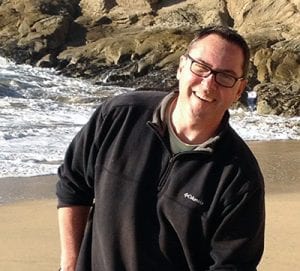 In 1978, John Travolta had jumped from Saturday Night Fever to Grease, and a ninth grader in Virginia was jumping through a phone line into the campus computer at George Washington University.
In 1978, John Travolta had jumped from Saturday Night Fever to Grease, and a ninth grader in Virginia was jumping through a phone line into the campus computer at George Washington University.
“My brother was a Ph.D. student there, and I figured out how to dial into the university to play games on the mainframe using a portable teletype my mom brought home for work,” said Rice computer science alumnus John Q. Smith (B.A. ’86).
“There were no personal computers, and it was fun to keep building on what I could do. But a career in computers? That didn’t occur to me.”
When Smith arrived at Rice, he focused on Physics and fell in love with Quantum Mechanics. Then he signed up for COMP 220 as a sophomore and began reading about a programming language called Pascal.
Smith said, “I was so engaged by the textbook that I started working on the problems right away. I read the whole book in about two weeks. It appealed to my builder approach and personality. Everything just clicked, and that class revealed to me who I was and provided the scaffolding on which to hang my future self. The choice was made for me. Game over.”
Because resources were limited, Smith was forced to form and retain models in his own memory and master the art of debugging and optimizing his code across stacks of continuous feed computer printout paper.
“We had to schedule time on the mainframe in the lab. People would be waiting for you to get off the terminal, so you had to accomplish things in a short amount of time. Pouring over those printouts prompted you to think through the next problem more carefully, so you wouldn’t have to spend much time debugging. It was good training for later on,” he said.
After working for the Department of Defense for six years, Smith began wondering if there might be new technologies to explore. Then a friend invited him to visit San Francisco.
“The energy of the place was completely insane in the early 1990’s and it messed up the image of who I thought I was back in DC. Everyone I met in San Francisco was talking about the things I was interested in and wanted to pursue. After one day there, I’m like ‘Yeah, I’m moving!’ It took a bit of time to wrap up my life and projects in DC, then I headed to Silicon Valley and jumped into the startup life.”
In his previous role, he’d focused solely on engineering in a large organization. Smith wanted exposure to the rest of an organization and working for startups threw him into the heart of business development, negotiation, sales and marketing, project management and product management.
He said, “It is nerve-wracking and makes for a very intense life. You have to strike a balance between reward and risk. You only seem to hear about the successful startups, those who make it and create a $30B company, like Airbnb. But the vast majority of startups don’t hit the grand slam. For me, there is value to the journey, regardless of the destination.”
Smith’s exposure to a broad range of the industry was bolstered by friends and former co-workers contacting him with projects. He felt Silicon Valley was – in some ways – an amalgam, acting as one giant corporation.
“You’ll work for one company and make your reputation. Later a friend will reach out and say, ‘I have to have you help me on this.’ Your reputation is the one key thing of value that goes forward with you across all companies. Twenty-five years later, I’m still running across people I’ve worked with before and we’re working together again. Do good work, and people will find they need your skills.”
Building on a string of diverse roles at a collection of startups, Smith brought his product development skills to Airbnb where he focused on solutions for complex housing markets. Then he was invited to join a team that worked to reduce all forms of discriminatory behavior across the company’s platform. In less than a year, Smith was diving into startup mode again — this time within Airbnb.
“Airbnb Plus is the closest thing to a startup you can get in Airbnb. I was there for the inception and got to build a team of 40 engineers across all functions. In 13 months, we were up and running.
Smith relishes the new directions each day brings. He said, “No day is ordinary in a startup environment. If you can create systems such that people accomplish things and those systems are working properly, that’s a good day. An awesome day is when you launch something like Airbnb Plus.
“In leadership, you have to put a lot of things in motion at once and people are naturally resistant to change. Most days, you end up fire fighting and unblocking people so they can move forward. Then things start to shift and you get to see the effect of the organizational changes starting to bear fruit. That’s another good day.”
Smith has worked for several strong leaders, developing his own style of management along the way. His first priority is to create an environment of safety for his teams. He referenced a 2016 New York Times article about a Google study that revealed team members who felt emotionally safe performed best.
John Q. Smith completed his B.A. in CS at Rice University in 1986.